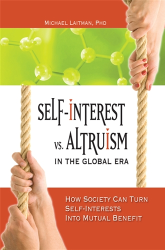
The wisdom of Kabbalah tells us how the Creator’s quality of bestowal creates a desire, out of nothing, a desire to receive pleasure, and how this creature has similarity with the end of its development.
After an initial four phase development the creature realizes its total opposition to its source, end enters a new phase, using a bestowing intention to progress towards the desired similarity.
We learn how the creation receives what pleasure it can in order to bestow, and builds itself to be as similar as possible to its Creator. However, even after all the worlds have been established in the Partzuf, and all the lights that could be received in order to bestow are received in the Partzuf, there still remains one desire that cannot be made to work in the Partzuf—the desire to be like the Creator. This is the desire that the host in Ashlag’s allegory was referring to when he said, “In this case, there has never been born a person who could fulfill your wishes.” This is the most intense desire, the core desire of Stage Four, and at the same time it is utterly unachievable.
So once all the desires were exploited to the maximum, the creation’s (the company) marketing department (surrounding light), reminded the company management—the Rosh (head) of creation—that there was still more light to be received. Now it was the Rosh’s duty to examine this new desire and determine if it could receive this desire with the intention to bestow.
Do You Fall for this Hidden Temptation that Is Impossible To Resist?
For this reason, the Rosh assembled a special board meeting to discuss the fate of this last desire. In this meeting, the argument for not using it was that it was too strong to handle. Indeed, how can one handle a desire to be like one’s parent? If the Partzuf actually received what it wished for in that desire, it would be similar to a child instantly becoming an adult, without the knowledge and experience acquired over the years of growing up. Clearly, this was too complicated and too dangerous a desire to handle.
“On the other hand,” argued other directors, “If we consider the nature of this desire, we will realize that there cannot be any danger in it. In fact,” they claimed, “it is fail-safe.”
“How so?” wondered the opposers. “It is fail-safe because of the nature of the desire itself—to be like the Creator, a giver. How dangerous can it be to want to give?”
The advocates convinced the opposers, and the decision was made for the creation to hire the biggest desire—the wish to be like the Creator. To do this, Creation built a distinct Partzuf, called Adam ha Rishon (The first Man), and assigned it the task of operating and managing the last and greatest desire of all.
However, the decision to try to receive the last and greatest of all pleasures turned out to be a fatal error. What the creation did not know was that the biggest light, which comes with the biggest desire, has a gift attached to it. When you become Creator-like, you become Creator-like in the full sense of the word, not just in your desire to give, but also in your ability to give—to create— you become omnipotent and omniscient. This was a pleasure that the creation could not receive with the intention to bestow.
As soon as Adam, the specially designed Partzuf, began to receive the light, he (Adam) discovered the gifts attached to the light, and they were so blindingly enticing that he completely forgot about the intention to give.
And the minute Adam began to think in this way, he tried to act on it, to be a creator. However, to create you need a desire to give, and Adam did not have it. This reawakened the inferiority and shame that were covered by the initial Masach in Stage Four, and with it, the light vanished, just as it did during the restriction.
Are You Also in this Concealment?
But Adam’s desire could no longer be reversed; he saw what pleasures await those who become like the Creator and could not forget it. And for this reason, Adam could not be made to work in order to bestow, since he knew that if only he could find a way to be like the Creator, he would be the sole ruler of the universe, of the whole of reality. Thus, Adam became selfish to the core, each part of him wishing to be like the Creator. And in consequence, the selfish parts disintegrated into myriad fractions, each with its own selfish little desire to become like the Creator.
The disassembling of Adam’s Partzuf is known as “the breaking of Adam’s soul” or “the breaking of the soul” for short. With Adam’s shattering, a new entity appeared in reality—an egoistic entity—whose desire is to bestow upon itself, rather than upon the Creator, and whose ultimate wish is for omnipotence and omniscience, rather than for total bestowal.
In Kabbalah, explains Baal HaSulam in the “Preface to the Wisdom of Kabbalah,” the difference between spirituality and corporeality is that in the spiritual realm, there is no desire to receive without a Masach, while in the corporeal realm there is only a desire to receive without a Masach. Hence, our universe is the only corporeal realm in existence, and all that exist in our universe are the offspring of the shattering of Adam’s soul.
The reason why we consider our universe a “world,” the same term we ascribe to the spiritual worlds, is that a “world” reflects a certain measure of concealment of light. The only difference between our corporeal universe and the spiritual worlds is that in a spiritual world, even when there is no light at all, there is still awareness of the Creator’s quality of bestowal and there is a desire to have it. In our universe, there is such complete concealment that we are not even aware of the meaning of the word, “Creator,” and think of it as an entity (if not a person) that awaits our pleas in return for a merciful response.
Now You Can Realize Your Free Choice
In Hebrew, humans are called Bnei Adam (the children of Adam). Indeed, we are the offspring of Adam’s mistake, and it is therefore only we who can mend his mistake. Being the only species that can choose its course in life, humans are the only ones who can determine the fate of all life on earth—for better or for worse.
As we will see as we delve deeper into the study of Kabbalah, save for humans, the whole of Nature abides by a rule that aligns it with the laws of the spiritual worlds. We, on the other hand, must learn to abide by that rule by ourselves. By wanting to have the intention to give more than the gift that comes with giving (omnipotence and omniscience), we can mend Adam’s mistake. That is, by choosing the intention to give, the gift will still be attached to it and we will still receive omnipotence and omniscience. However, because we will have the intention to give, we will receive the gift of being Creator-like because we will know that by doing so we are pleasing the Creator, who wants to give us this gift. As a result, we will enjoy the gift, but will not be broken—falling into self-centeredness—as it happened the first time. This will be the end of correction for the whole of humanity, and attainment of the purpose of creation, as intended in the Creator’s thought of creation.
 “Do You Make this Mistake While Enjoying Something?” is based on the book, Self Interest vs. Altruism in the Global Era: How Society Can Turn Self Interests into Mutual Benefit by Dr. Michael Laitman.
“Do You Make this Mistake While Enjoying Something?” is based on the book, Self Interest vs. Altruism in the Global Era: How Society Can Turn Self Interests into Mutual Benefit by Dr. Michael Laitman.

What about Eve?
Kind regards,
JCWB